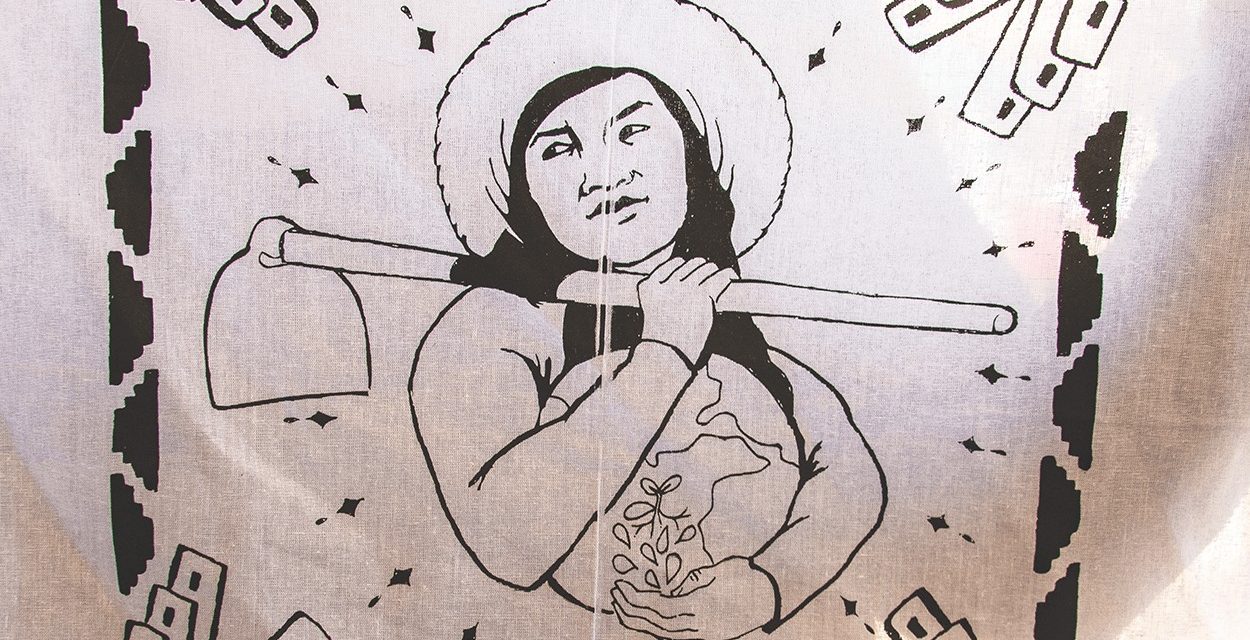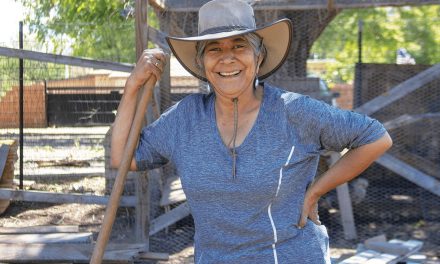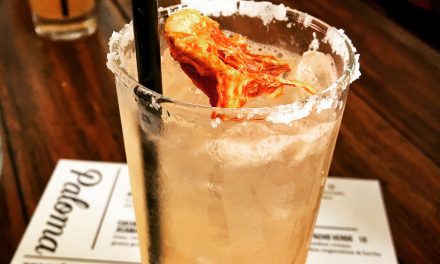By Sayrah Namaste and Florencia Asbury

White bandana worn by women farmworkers represents fighting back against sexual violence. The white bandanas featuring an illustration of Dolores Huerta were worn in celebration of Cesar Chavez Day in Albuquerque on April 5, 2018. Photo by Stephanie Cameron.
When we bite into a New Mexican chile pepper, we seldom think about the farmworkers and the harsh conditions they endured to bring us this simple pleasure. Many of these farmworkers are undocumented and have very little recourse when they experience violence and harassment in the fields. In New Mexico, roughly one-third of these workers are women. The sexual exploitation of farmworker women is coming into the national conversation as the #MeToo movement spreads far beyond Hollywood. Alianza Nacional de Campesinas, the first national women’s farmworker organization in the US created by current and former farmworker women, along with partnering organizations and allies, is raising awareness of this problem. Armed with the symbol of a white bandana, the previously muffled voices of women farmworkers are rising to the forefront and trying to hold sexual predators accountable.
To understand the severity of female sexual exploitation in the fields, we reached out to women who have worked closely on the plight of farmworker issues and conditions. Women who come to the US seeking work in the fields in the hope of a better future are frequently preyed upon in exchange for the promise of securing that future.
When Hollywood actresses began speaking out about their experiences of sexual harassment, Alianza Nacional de Campesinas sent a letter in solidarity, representing 700,000 farmworker women who have experienced workplace sexual harassment and/or assault. The letter, which was published in TIME in November 2017, also aimed to publicly recognize that this is an industry full of women working long hours under the blazing sun and enduring exposure to pesticides, low wages, and substandard living conditions, who have begun shielding themselves with white bandanas in hopes of escaping sexual advances.
“We wish that we could say we’re shocked to learn that this is such a pervasive problem in your industry,” wrote the farmworker women. “Sadly, we’re not surprised because it’s a reality we know far too well. Countless farmworker women across our country suffer in silence because of the widespread sexual harassment and assault that they face at work. We do not work under bright stage lights or on the big screen. We work in the shadows of society in isolated fields and packinghouses that are out of sight and out of mind for most people in this country. Your job feeds souls, fills hearts and spreads joy. Our job nourishes the nation with the fruits, vegetables and other crops that we plant, pick, and pack.”
We asked Mily Trevino-Saucedo, the co-founder and vice president of the Alianza Nacional de Campesinas, how the letter to Hollywood #MeToo activists came about. “We farmworker women understood what happens when women speak up and we understand the courage it takes. The main intent of the letter was to give a message that they are not alone, that we understood what they experienced—and that we believed them.”
Trevino-Saucedo started working as a farmworker with her family at the age of eight, first in Idaho and then in the fields of California not far from the glitzy world of Hollywood. She would never have expected that a group she co-founded would, decades later, receive a powerful response signed by three hundred actresses and published as an open letter in the New York Times. This led to the formation of the Time’s Up initiative, and a member of the Alianza appeared alongside celebrities Taylor Swift and Ashley Judd as part of the TIME magazine 2017 Person of the Year, “The Silence Breakers.”
Trevino-Saucedo has been organizing farmworker women—campesinas—for thirty years. “It was easier to talk about topics like how spraying fields with pesticides impacted women’s health and reproduction. And the problem of low wages and the discrimination against women worsened as they aged. That was easier to talk about than sexual abuse,” she explained. “So we used theater to talk about the taboo topics like sexual harassment in the fields.” She described theater vignettes in which women acted out different scenes and a facilitator would pause and ask the audience what they observed. This was the way to bring up the painful but daily reality for so many women farmworkers who were sexually harassed.
A 2012 Human Rights Watch study found that approximately eighty percent of women farmworkers reported having experienced some form of sexual violence on the job. In comparison, between twenty-five and fifty percent of all working women have experienced at least one incident of sexual violence on the job, and approximately one in five women in the United States has been raped. The terrible conditions for farmworker women are the result of the tremendous imbalance of power in agriculture. Farmworkers are arguably the most exploited workers in America, as they are exempt from most labor laws and have the highest rates of poverty compared to workers in other industries.

La Marcha de Justicia during the twenty-fifth annual César Chávez Day Fiesta at the National Hispanic Cultural Center. Photo by Stephanie Cameron.
Equal Employment Opportunity Commission staff in Fresno, California, reported that hundreds, possibly thousands, of farmworker women were forced to have sex with supervisors to get or keep jobs. Most had to put up with propositions for sex and constant, inappropriate touching by supervisors. Often women dress like men in order to protect themselves in the fields. Many farmworkers do not have documentation of their legal status, and supervisors know they won’t report the abuse because of fear that immigration authorities could deport them.
According to the Southern Poverty Law Center (SPLC), “[Undocumented women] are often the primary caregivers for children, making them less likely to assert their rights for fear of being fired or, worse, being deported and separated from their families. And because of their fear of being reported to immigration authorities, they are reluctant to report wage violations, sexual violence, or gender discrimination, or to take legal action to stop it.”
When Trevino-Saucedo and the Alianza tried to access help from local police departments, crisis centers, and women’s shelters, they discovered that these agencies were ill-prepared to assist farmworker women. Most of their materials were written, and many of the victims did not read English or Spanish. Yet the agencies were often unwilling to hear feedback from campesinas about how to improve their services.
Mónica Ramirez, co-founder of the Alianza, created the White Bandana Project in 2007 while she was the project director of Esperanza: The Immigrant Women’s Legal Initiative of the Southern Poverty Law Center. The Bandana Project is a public awareness campaign addressing the issue of workplace sexual violence against migrant farmworker women. White bandanas are decorated and displayed to symbolize the sexual abuse of farmworker women because they have said that they use their clothes, including bandanas, to protect them from sexual harassment and assault at work. A coalition that included the SPLC created the Farmworker Sexual Violence Technical Assistance Project in 2008 to provide legal assistance and safety plans for farmworker victims.
New Mexico−born Dolores Huerta, who co-founded the United Farm Workers Union with Cesar Chavez in 1972, talked with us about the sexual harassment of farmworker women while celebrating Cesar Chavez Day in Albuquerque this year. “This happens all the time because farmworker women are so isolated when they are in the fields. I think there is a little bit more awareness now, but way back there when we were organizing it was really, really bad. You know? It was really bad.” And what about now, we wondered? “Some of the same issues are still there,” Huerta said. “Women are afraid to report any sexual harassment because they are afraid they will lose their job. And because you have families who work together, when they fire the woman, they won’t just fire just her but they will fire the whole family.”

Dolores Huerta speaks during the twenty-fifth annual César Chávez Day Fiesta in Albuquerque.
Photo by Stephanie Cameron.
Huerta’s work with the United Farm Workers Union was historic in its effectiveness at improving the wages and working conditions of farmworkers, as well as raising the consciousness of American consumers. Many people think unions aim simply to improve wages, but they are also vehicles to make workplaces safer and to provide recourse for abuse. The movement Huerta helped create continues in its efforts to create dignity and justice for the people we rely on for the food we eat.
The Coalition of Immokalee Workers (CIW), a worker-based human rights organization in Florida, is recognized for its achievements ending gender-based violence in the agricultural industry. Their Fair Food Program is a unique partnership among farmers, farmworkers, and retail food companies. Like the United Farm Workers Union, the program works to ensure fair wages and working conditions for the workers who pick fruits and vegetables on participating farms. The producer of the PBS Frontline documentary, Rape in the Fields, described the Fair Food Program as “unique in the country for preventing sexual violence.” Since 2011, they have resolved more than 1,800 complaints by workers.
Regionally, some wonderful organizations support farmworker women. One is the Border Farm Worker Center in El Paso, which provides New Mexico and Texas farmworkers with services including a medical clinic, showers, food, English classes, arts programs, and recreation for both children and adults. The center is open seven days a week from 4pm to 6am, offering an alternative to sleeping outside on a piece of cardboard, as many farmworkers in the area did before it opened in 1993. The center also educates workers about their right to a fair wage and safe work environment. Alicia Marentes, the center’s director of social services, helps women farmworkers document complaints of sexual misconduct. This work and education is crucial if we are to break the silence and cycle of sexual violence perpetrated against this vulnerable population.
When farmworkers organize and consumers support them, change can happen.
If you’d like to support local farmworker women, consider donating to the Border Farm Worker Center. Donate online at www.paypal.me/centrosinfronteras or send donations to Border Agricultural Workers Project, 201 East Ninth Avenue,
Edible celebrates New Mexico's food culture, season by season. We believe that knowing where our food comes from is a powerful thing. With our high-quality, aesthetically pleasing and informative publication, we inspire readers to support and celebrate the growers, producers, chefs, beverage and food artisans, and other food professionals in our community.

















